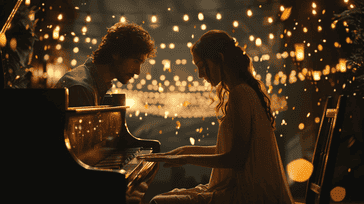
Welcome to our exploration of the captivating world of movie soundtracks! In this article, we will dive into the power of music in the entertainment industry, specifically the film industry. From the bustling streets of Hollywood to the resounding success at the box office, movie soundtracks have a profound impact on our cinematic experiences.
Music has the remarkable ability to evoke emotions, transport us to different times and places, and create a lasting connection with the stories on the big screen. Whether it's the swelling orchestral score that accompanies a climactic scene or the catchy pop song that captures the spirit of a coming-of-age film, the right soundtrack can make a movie truly memorable.
Join us as we uncover the birth of iconic soundtracks, the influence of music on box office success, the crucial role of music in movie trailers, and the contributions of celebrity musicians to the world of film. We'll also shed light on how movie soundtracks can shape critical reception and add an extra layer of depth to the cinematic experience.
Key Takeaways:
- Movie soundtracks have the power to elicit emotions and transport audiences into the heart of a story.
- The right soundtrack can contribute to a film's box office success by enhancing audience engagement.
- Music plays a crucial role in setting the tone and building anticipation in movie trailers.
- Celebrity musicians have made their mark in the film industry through on-screen performances and contributions to soundtracks.
- Movie soundtracks can influence critical acclaim and play a vital role in shaping the overall perception of a film.
The Impact of Music on Cinematic Experience
Music has always been an integral part of the film industry, contributing to the overall cinematic experience. From the early days of silent movies accompanied by live music to the modern digital age, music has the power to enhance emotions, build tension, and transport viewers into the heart of a story.
Whether it's a sweeping orchestral composition or a catchy pop song, movie soundtracks have the ability to evoke specific moods and create lasting impressions. The right musical score can intensify the drama of a scene, evoke a sense of nostalgia, or elicit a strong emotional response from the audience. It can amplify the suspense in a thrilling action sequence, provide a sense of romance in a love story, or add a touch of melancholy to a poignant moment.
The collaboration between filmmakers and composers is crucial in determining the impact of music on a film. Directors work closely with composers to ensure that the music aligns with their creative vision, enhancing the narrative and driving the story forward. Composers carefully craft melodies, harmonies, and rhythms that complement the visual elements, creating a seamless blend of sight and sound.
Moreover, the choice of music can also offer cultural references and help establish a film's time period or setting. By incorporating popular songs from specific eras or regions, filmmakers can create a sense of authenticity and transport audiences to a different time and place.
"Music and cinema have always been inseparable. The right music enhances the storytelling, engages the audience on a deeper level, and leaves a lasting impression long after the movie ends."
By engaging the sense of hearing, music adds a layer of depth to the visual elements of a film, creating a fully immersive experience. It has the power to captivate the audience, amplify the impact of the scenes, and leave a lasting impression beyond the theater walls.
The Birth of Iconic Movie Soundtracks

Movie soundtracks have the power to transcend the screen and become cultural touchstones, leaving a lasting impact on popular culture. From the classics to the contemporary, these iconic soundtracks have shaped the film industry and continue to be cherished by audiences worldwide.
The Origins of Iconic Soundtracks
Some of the most memorable movie soundtracks have originated from Hollywood, the heart of the film industry. Combining the artistic vision of composers and the collaborative efforts of filmmakers, these soundtracks have seamlessly blended with the cinematic narratives, enhancing the storytelling experience.
One such example is the epic theme from the film "Gone with the Wind" (1939), composed by Max Steiner. This sweeping orchestral score not only captured the essence of the film but also set a new standard for film scores, paving the way for future iconic soundtracks.
Another notable soundtrack is "Saturday Night Fever" (1977), which showcased the disco era with a collection of Bee Gees songs. This soundtrack not only became a global phenomenon but also helped popularize disco music in mainstream culture.
Transcending Their Respective Movies
While movie soundtracks are created to accompany specific films, some have transcended their original context and become musical classics in their own right. These soundtracks have achieved widespread popularity and continue to be celebrated independently from the movies they were initially composed for.
One prime example is the soundtrack from the film "The Sound of Music" (1965), composed by Richard Rodgers and Oscar Hammerstein II. The songs from this musical have become timeless classics and are beloved by audiences of all generations, showcasing the enduring power of a well-crafted movie soundtrack.
Similarly, the soundtrack from the film "Pulp Fiction" (1994), curated by Quentin Tarantino, brought together an eclectic mix of genres and artists. This compilation of songs not only complemented the film's narrative but also introduced audiences to a diverse range of music, leaving a lasting impact on popular culture.
"The power of movie soundtracks lies in their ability to transport us to different worlds, evoke deep emotions, and stay with us long after the credits roll. They are a testament to the artistry and collaboration that goes into creating a truly unforgettable cinematic experience." - [Author]
Music and Box Office Success
When it comes to the success of a movie at the box office, the right soundtrack can make all the difference. A well-curated collection of songs and musical compositions can create memorable moments and enhance audience engagement, elevating a movie's commercial appeal.
Studies have shown that movies with popular and iconic soundtracks tend to perform better at the box office. A compelling soundtrack not only enhances the emotional impact of a film but also resonates with audiences long after they have left the theater.
Consider the case of "Guardians of the Galaxy" directed by James Gunn. The film's soundtrack, aptly named "Awesome Mix Vol. 1," consisted of popular songs from the 1970s, creating a nostalgic atmosphere that perfectly complemented the space opera storyline. This unique soundtrack became a major selling point for the film and contributed significantly to its box office success, grossing over $773 million worldwide.
"The soundtrack of 'Guardians of the Galaxy' played a crucial role in the film's success. It tapped into the nostalgia of the audience and created a powerful connection with the characters and story. It's a great example of how music can enhance a movie's commercial appeal and drive box office performance." - James Gunn, Director
Additionally, the use of original music scores can also have a significant impact on a film's success. Acclaimed composer Hans Zimmer is renowned for his ability to create powerful and immersive soundtracks that enhance the cinematic experience. His work on films like "The Dark Knight" and "Inception" not only elevated the storytelling but also contributed to their box office achievements.
To illustrate the correlation between music and box office performance, we can analyze the top-grossing films of all time. Several of these movies have become iconic not only for their visual spectacle but also for their memorable soundtracks. Take, for example, "Titanic" directed by James Cameron. The film's theme song, "My Heart Will Go On" by Celine Dion, became a global sensation and played a pivotal role in its commercial success.
| Movie | Worldwide Box Office Gross | Iconic Soundtrack |
|---|---|---|
| Titanic (1997) | $2.19 billion | My Heart Will Go On |
| Avatar (2009) | $2.84 billion | No specific song, but James Horner's score contributed to the film's success |
| Avengers: Endgame (2019) | $2.79 billion | Various music cues and Alan Silvestri's iconic Avengers theme |
These examples demonstrate how a well-curated soundtrack can become inseparable from the film's identity, resonating with audiences and contributing to a movie's box office success. Filmmakers and studios understand the value of music in creating a deeper connection with viewers and ensuring a memorable cinematic experience.
Ultimately, the correlation between music and box office success highlights the importance of a carefully crafted soundtrack. Whether it's through popular songs or original compositions, the right music can capture the hearts and minds of audiences, driving ticket sales and solidifying a film's place in box office history.
The Role of Music in Movie Trailers

In the world of entertainment and film industry, movie trailers serve as thrilling teasers for upcoming releases, capturing the attention of audiences worldwide. While visuals play a crucial role in enticing viewers, it is the power of music that truly sets the tone and builds anticipation. Movie trailers are carefully crafted to create an emotional impact and leave a lasting impression, and the soundtrack plays a vital role in this process.
The significance of music in movie trailers cannot be overstated. Just like a symphony conductor sets the mood for a performance, the right music can evoke the desired emotions and captivate the audience. Whether it's a sweeping orchestral composition, a catchy pop song, or a haunting melody, the music in a trailer has the power to create an immediate connection with the viewers and enhance their perception of the film.
Music serves as the backbone of a movie trailer, guiding the narrative and enhancing the visual experience. It has the ability to heighten suspense, build tension, and even foreshadow key plot points. By carefully selecting the right tracks, film studios can create a sense of excitement and intrigue, leaving the audience eagerly anticipating the film's release.
The Impact of Music in Movie Trailers
"The role of music in movie trailers is to evoke emotions and set the stage for the story that unfolds on screen. It's like the heartbeat of the trailer, guiding the audience through a rollercoaster of emotions", says renowned film composer John Williams.
Music in movie trailers not only serves as a powerful tool to engage the audience but also helps in establishing the film's identity. Iconic soundtracks can become synonymous with the movie itself, immersing viewers into the world created by the filmmakers. Think of the haunting theme from "Jaws" or the epic orchestral score from "Star Wars" – these tracks have become a part of cinematic history, inseparable from the films they represent.
By incorporating well-chosen music into movie trailers, filmmakers can create buzz and generate interest in their projects. A compelling soundtrack can make a trailer go viral, with viewers eagerly sharing and discussing it on social media platforms. This organic interest can translate into success at the box office, as the anticipation generated by the music draws audiences to theaters.
How Music Impacts Audience Perception and Interest
Studies have shown that the inclusion of music in movie trailers has a significant impact on audience perception and interest in a film. The right music can make a trailer captivating, leaving a lasting impression on viewers and making them want to see the movie when it's released. On the other hand, poorly chosen or generic music may fail to create the desired emotional connection, resulting in a lackluster response from the audience.
Through strategic use of music, filmmakers can manipulate viewers' emotions, influencing their perception of the film even before it hits the theaters. A thrilling action sequence accompanied by an adrenaline-pumping soundtrack can make a movie appear more exciting and intense. Conversely, a heartfelt scene set to a beautiful ballad can evoke a sense of tenderness and sincerity.
The role of music in movie trailers is not limited to setting the tone; it also helps in conveying the film's genre, themes, and overall atmosphere. By selecting music that aligns with the intended message and target audience, filmmakers can effectively communicate the essence of their film and pique the curiosity of potential viewers.
In the competitive world of Hollywood, where countless movies are vying for attention, the role of music in movie trailers becomes even more critical. It acts as a powerful marketing tool, shaping audience perception, and driving interest in upcoming releases. With the right combination of visuals and music, a well-crafted movie trailer has the potential to leave a lasting impact and ensure the success of a film.
Celebrating Celebrity Musicians in Film
Over the years, many talented musicians have successfully transitioned into the world of acting, leaving an indelible mark in cinematic history. Their on-screen performances and contributions to movie soundtracks have captivated audiences and elevated the entertainment value of films.
When renowned musicians step into the realm of acting, their star power and artistic abilities add a unique dynamic to the characters they portray. Their natural stage presence and creative flair allow them to bring authenticity and depth to their roles, captivating viewers and garnering critical acclaim. Whether it's an iconic musician playing a supporting character or taking on a lead role, their performances often leave a lasting impression.
Furthermore, celebrity musicians bring their musical expertise to the film industry by lending their talent to movie soundtracks. Their contributions create an immersive sonic experience that complements the visual storytelling, enhancing the emotional impact of the film. From writing original songs to reimagining popular tracks, musicians add a melodic layer to the narratives, capturing the essence of the story and resonating with audiences.
"Musicians-turned-actors have the unique ability to connect with audiences on multiple levels. Their on-screen charisma combined with their musical talent adds depth and complexity to the characters they portray." - Film critic
Hollywood has witnessed numerous successful collaborations between celebrity musicians and the film industry. From Elvis Presley's charismatic performances in movies like "Jailhouse Rock" and "Love Me Tender" to Lady Gaga's mesmerizing portrayal in "A Star is Born," these musicians have demonstrated their versatility and artistic prowess on the silver screen.
Impact on Pop Culture and Box Office
The inclusion of celebrity musicians in films not only attracts their dedicated fan base but also garners widespread attention from moviegoers. This crossover appeal gives the film an added allure, creating buzz and anticipation surrounding the project. The combination of a renowned musician and compelling storytelling often leads to box office success and further solidifies the influence of celebrity musicians in the film industry.
Celebrity musicians in film also have a profound impact on pop culture. Their performances and contributions to soundtracks transcend the screen and become part of the cultural fabric. Iconic songs from movies like "Footloose," "Purple Rain," and "Titanic" have become timeless classics, continuing to resonate with audiences long after the films' release.
Recognizing Their Contributions
Celebrity musicians who excel in the world of acting deserve recognition for their contributions to the film industry. Their ability to seamlessly transition between different art forms and showcase their versatility is a testament to their talent and dedication. Their performances and musical contributions enrich the entertainment landscape, enhancing the overall cinematic experience for viewers worldwide.
The Critical Role of Movie Soundtracks

Movie soundtracks play a vital role in the success and reception of a film, often making or breaking its critical acclaim. The seamless integration of music enhances storytelling and creates memorable cinematic moments. From setting the tone to evoking emotions, movie soundtracks contribute significantly to the overall impact of a film on audiences and movie critics.
How Music Influences Movie Reviews
Movie reviews provide valuable insights into the quality and overall appeal of a film. Music plays a critical role in determining the reviewer's perception and assessment of a movie. The carefully chosen soundtrack can enhance the emotional depth of the story, intensify the impact of key scenes, and create a lasting impression on both critics and viewers.
"The combination of visual storytelling and music is a powerful tool in creating a cinematic experience that resonates with audiences. A well-crafted soundtrack can elevate a film's narrative and make it a truly immersive and memorable viewing experience." - [Name of Film Critic/Reviewer]
The synergy between visuals and music can captivate the audience, leaving an indelible mark on their movie-watching experience. By greatly influencing the emotional journey of viewers, movie soundtracks contribute to the critical evaluation of a film's artistic and entertainment value.
Impact on Critical Acclaim
Movie soundtracks can significantly contribute to a film's critical reception. A well-executed soundtrack, whether composed of original music or carefully curated licensed tracks, can elevate the artistic merit and overall quality of a movie. It enhances the immersive experience and helps the audience connect with the characters, themes, and narrative structure, ultimately influencing the perception and rating of movie critics.
Critics often highlight the effectiveness of a film's soundtrack in enhancing the storytelling and atmosphere, showing appreciation for the attention to detail and the seamless integration of music into the narrative. Conversely, a poorly chosen or executed soundtrack can detract from the overall viewing experience and negatively impact a film's critical reception.
The Perfect Marriage of Film and Music
The success of a movie soundtrack lies in its ability to create a symbiotic relationship with the visuals on screen. When the right music is paired with the right scene, it can elevate the emotional impact, intensify the tension, and immerse the audience in the world of the film.
The collaboration between filmmakers and composers is crucial in achieving the desired synergy between music and visuals. Working closely together, they ensure that the soundtrack complements the director's artistic vision and enhances the narrative, creating a cohesive and captivating movie-watching experience.
| Movie | Soundtrack | Critical Acclaim |
|---|---|---|
| The Dark Knight | Hans Zimmer - James Newton Howard | Received widespread critical acclaim for its intense and atmospheric score, elevating the film to new heights |
| Pulp Fiction | Various artists - Quentin Tarantino | Regarded as one of the best movie soundtracks of all time, contributing to the film's cult status and critical acclaim |
| The Social Network | Trent Reznor - Atticus Ross | Acclaimed for its innovative and unconventional approach to film scoring, adding depth to the narrative and characters |
Conclusion
In conclusion, movie soundtracks play a vital role in shaping our cinematic experiences. They have the power to transport us to different worlds, evoke emotions, and create iconic moments. Music adds depth, enhances storytelling, and elicits emotional responses that make movies truly memorable.
From Hollywood blockbusters to indie films, the film industry recognizes the importance of well-crafted soundtracks. These compositions not only set the mood and enhance the visuals but also contribute to a film's commercial success. The right soundtrack can create a lasting impression on audiences, elevating a movie from mere entertainment to a cultural phenomenon.
Movie soundtracks have become an integral part of the entertainment industry, extending their influence far beyond the screen. They drive box office performance, generate critical acclaim, and contribute to the overall cinematic experience. The collaboration between filmmakers and composers in creating these musical masterpieces showcases the power of artistry in the cinema industry.
In essence, movie soundtracks are the unsung heroes behind the magic of movies. They touch our hearts, ignite our imaginations, and become woven into the fabric of our collective memories. As we immerse ourselves in a film, it is the soundtrack that guides us through the emotional journey, leaving a lasting impact that resonates long after the credits roll.
FAQ
How important are movie soundtracks in creating emotional impact?
Movie soundtracks play a crucial role in creating emotional impact. They can enhance the mood, intensify emotions, and bring depth to the storytelling, making the scenes more memorable and immersive.
Can a well-curated soundtrack contribute to a film's commercial success?
Yes, a well-curated soundtrack can contribute to a film's commercial success. A catchy or iconic soundtrack can generate buzz and anticipation, attract a wider audience, and even boost ticket sales at the box office.
How do movie soundtracks influence movie trailers?
Movie soundtracks play a vital role in movie trailers. They help to set the tone, build suspense, and create excitement, capturing the attention of the audience and enticing them to watch the film.
Are there any musicians who have successfully transitioned into acting?
Yes, many musicians have successfully transitioned into acting. Examples include Queen's lead singer Freddie Mercury portrayed by Rami Malek in "Bohemian Rhapsody," and Lady Gaga's breakout role in "A Star is Born." These musicians have made a mark in the film industry with their on-screen performances.
Can movie soundtracks impact critical reception and movie reviews?
Yes, movie soundtracks can impact critical reception and movie reviews. A well-composed soundtrack can enhance the overall cinematic experience, lifting up the storytelling and earning praise from critics. On the other hand, a lackluster or mismatched soundtrack may receive negative feedback from reviewers.







